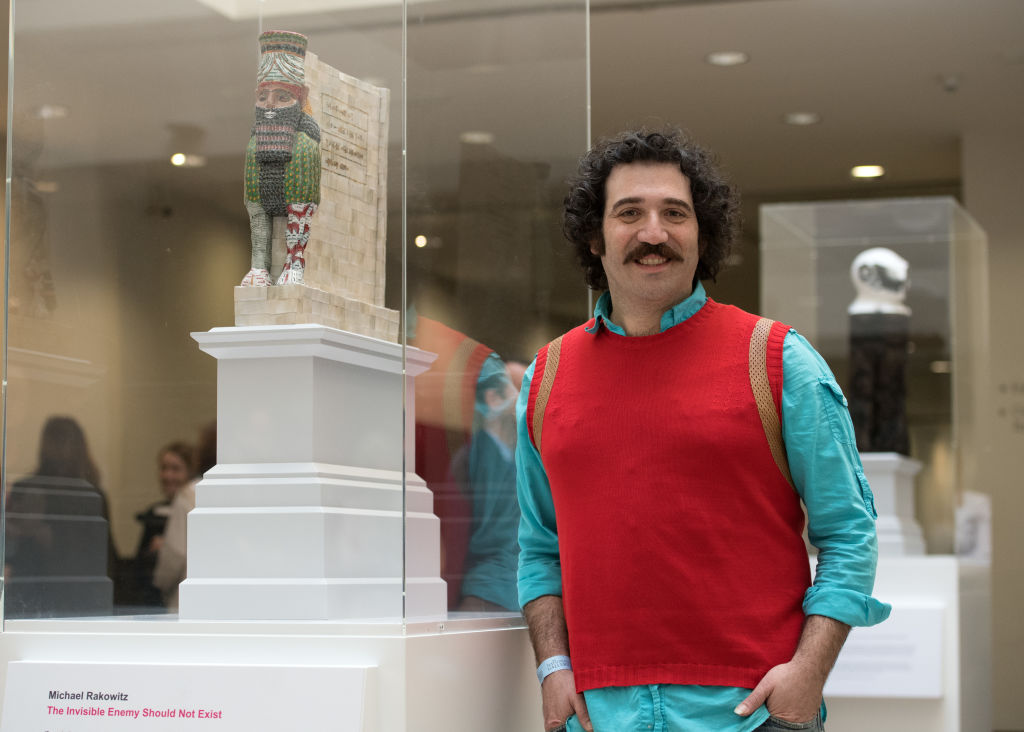
Michael Rakowitz has requested that one of his videos—included in the current MoMA PS1 exhibition, “Theater of Operations: The Gulf Wars 1991-2011”—be paused, literally, in protest over a museum funder with ties to what the Chicago-based artist calls “toxic philanthropy.” The work in question, Return (2004–ongoing), depicts the artist’s efforts to import Iraqi dates to a Brooklyn store.
Rakowitz is joining a call by activist group Art Space Sanctuary requesting that a MoMA board member, Laurence Fink, the CEO of investment firm BlackRock, divest from private prisons in the US. Art Space Sanctuary also alleges that MoMA relies on Fidelity Investments to oversee its pension fund, and that Fidelity likewise invests in private prison companies.
Earlier this year, it emerged that Rakowitz had declined to participate in the Whitney Biennial over the presence on the Whitney Museum of American Art’s board of vice chairman Warren Kanders. (Kanders is the owner of Safariland, a company that supplies tear gas and other munitions that have been used on asylum seekers at the U.S.’s southern border; on protesters opposing an oil pipeline at Standing Rock; and on Palestinian demonstrators.) After statements from museum staff, academics and other art world professionals, as well as a request from eight other artists that their work be withdrawn from the exhibition in protest, Kanders resigned from the board.
The MoMA PS1 exhibition was previously targeted by British artist Phil Collins, who withdrew his work Baghdad Screen Tests over Fink’s presence on the board.
“It’s not the artist that needs to go away,” said Rakowitz in a phone interview, distinguishing his protest from Collins’s decision to simply remove his work from the show. “It’s the relationship to these abusive forms of finance that needs to disappear.” Rakowitz said that Black’s equity firm, Apollo, owns private-security firm Constellis, previously named Blackwater; military contractors from the firm killed 17 and injured 20 in the Nisour Square Massacre in 2007, while escorting a U.S. embassy convoy.
MoMA PS1 said, in a statement to The Art Newspaper: “From the inception of this exhibition in 2017, we’ve been fully committed to open communication with artists around the presentation of their work and how to amplify the crucial topics this exhibition explores. MoMA PS1 is committed to addressing timely issues, and respects the rights of all artists to decide when and where to show their work. With the presentation of ‘Theater of Operations,’ we remain focused on the global effects of the Gulf wars in Iraq—particularly in the context of the current political turmoil there.”
“I can’t continue to participate,” Rakowitz told Artnet News. “I’m looking to dismantle these things, not launder the reputation of these people that sit on these boards that become their tax havens.”
Rakowitz’s full statement to the museum is as follows:
I’ve decided to press the pause button on my video, RETURN, so that we can discuss some recent events.
Activists have called on MoMA Board Member Larry Fink, the CEO of BlackRock, to divest BlackRock (and its subsidiaries) from the prison corporations GEO Group and Core Civic, in which they are among the largest shareholders. Why? Because (a) these companies, under contract from I.C.E., have been responsible for approximately 70% of all immigration detentions, (b) these companies are part of a racist, carceral system which has made the U.S. the largest jailer in the world, and (c) BlackRock also controls funds that have purchased billions of dollars of shares in weapons manufacturers.
I broaden this activist call and also ask that the Chairman of MoMA’s Board of Trustees, Leon Black, divest his companies from Constellis Holdings. Constellis Holdings, formerly called Blackwater, is infamous for its role in the Nisour Square Massacre, during which Blackwater guards killed 17 Iraqi civilians and injured 20 more.
The opposite of RETURN is DEPART, which is derived from dispertire, which means to divide, to separate, to take leave of each other, to go away.
And yet, I wish to remain in Theater of Operations and not depart. What makes this exhibition exceptional is the bringing together of artwork made during and in response to the ongoing Gulf wars by artists around the world, with a particular focus on Iraqi artists who made art in the midst of the continuous traumas of siege, sanctions, and occupation. I am humbled to be presenting alongside so many artists I admire from my mother’s ancestral home, from which her family was forced to depart in the 1940s. To have such crucial work presented here is momentous. Indeed, it is not the artists who need to depart, it is museums’ dysfunctional and abusive relationship to toxic philanthropy that should go away.
I kindly request that Larry Fink and Leon Black please divest from these companies so that I may unpause my video and press play.
If this is not possible, then I kindly ask that MoMA please divest from Larry Fink and Leon Black as trustees so that I may unpause my video and press play.
And if this proves impossible, then I kindly ask that PS1 Contemporary Art Center please divest from its relationship with MoMA, so that I may unpause my video and press play.[1]
PS1 is a home for art and I respect all that has been done here by artists since the 1970s when it first opened. I would hate to depart.
[1] On Sunday, November 3, along with other participants in the exhibition, I met with MoMA PS1’s Director and curatorial staff. We were informed that PS1 has a separate Board of Directors than MoMA and that Larry Fink is not on PS1’s Board and therefore contributes no money directly to PS1. That may be. But this place is called MoMA PS1, Leon Black serves on its Board in an ex-officio capacity, and PS1 is responsible for the company it chooses to keep.